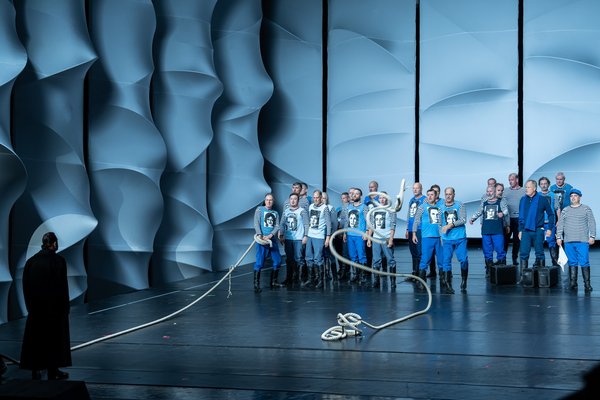
DER FLIEGENDE HOLLÄNDER (THE FLYING DUTCHMAN)
4 October 2024, 6 p.m.
In Brief
Opera in three acts, in German, with Hungarian, English, and German subtitles
'Wherever you open the score, you feel the wind blowing at you,' commented an elder contemporary of Richard Wagner when discussing Der fliegende Holländer. This sentence, although intended as a criticism, actually highlighted one of the greatest strengths of this romantic opera premiered in 1843: the apparent presence of the storm and the sea, unbridled natural forces that make the opera so unique. The accursed Dutchman, who can only step ashore every seven years, is the first of Wagner's heroes to yearn for the miracle of redemption through love. The tale of a woman's extreme sacrifice and a man carrying the crushing burden of his fate extends well beyond the traditional boundaries of German romantic opera.
Details
- Location
- Hungarian State Opera
- Date
- Oct. 4, 2024
- Start time
- 6 p.m.
- End time
- 9:15 p.m.
Synopsis
A ship is overtaken by a storm. The captain – Daland – takes shelter in the somewhat calmer waters of a bay in order to await a more favourable wind. They are forced to cast anchor, even though only a few miles separate them from their homes and their womenfolk. Daland's daughter, Senta, is awaiting his return home. The sailors go to have a rest, with only one remaining on watch. As the solitary seaman nods off, he sings of his loyal bride and the southerly wind that will take him home. Suddenly, a mysterious sailing vessel pulls up beside them: the ship belongs to the Flying Dutchman. “My time is up, after seven long years, the sufferer may return to shore again.” He is hoping for the redemption of death, and his crew echo his lament: “Come, eternal nothingness.”
Daland is the first to notice the newly arrived ship flying the Dutch flag, and he scolds his subordinate for failing to remain alert. The two captains converse cordially. A mutually beneficial business deal is outlined: the Dutch captain will pay handsomely if someone will host him for the night, and he will hand over his entire fortune if he finds a home not just for one night, but forever. Without hesitating, Daland offers the Dutchman his daughter's hand in marriage. The agreement is concluded.
The storm calms and a gentle south wind springs up to take the drifting sailors home. The Dutchman's phantom ship follows Daland and his crew.
The women and girls are hard at work, for life must go on even while their husbands and sweethearts are out on the wild seas. Only Senta's hands move slowly, as she daydreams about the portrait of a mysterious man. Ever since Mary related the fate afflicting the stranger in the picture, Senta has been unable to think about anything but the sad legend. She wants to hear the gloomy tale over and over again, as the figure of the grim mariner stirs her imagination ever more vividly. The girls urge her to tell the story of the accursed Dutchman herself now.
With extraordinary power, Senta recounts the story of the Dutchman. Growing ever more emotional, she finally declares that she wishes to redeem the accursed captain with her love and loyalty. She is practically beside herself when Erik, the huntsman, enters. He has brought news: Daland's ship has reached the shore safely.
When Erik and Senta are left alone, the young hunter nervously asks Senta what Daland will say if he asks for his daughter's hand in marriage, for Daland values wealth, and Erik is poor. And will Senta take his side? Senta gives evasive answers.
Erik relates how distressed he is over a dream he's had. In it, Daland arrives home with a strange seafarer, whom Senta welcomes warmly. Senta is unable to disguise the fact that she is daydreaming about the same thing. His spirit broken, Erik rushes out.
When Daland and the Dutchman enter, everything happens exactly as Erik feared and Senta hoped. Daland is satisfied: the Dutchman and Senta will tie their fates together. They decide to hold the wedding at the celebration of the crew's successful return home. “This girl's fidelity breaks the power of hell!” the Dutchman cries out triumphantly.
The sailors and the women celebrate merrily, but the ghostly singing of the Dutchman's crew puts an end to the fun. The despairing Erik grills Senta: how can she swear fidelity to a man whom she doesn't even know? He reminds her that they had once planned to share their future together. The Dutchman overhears their parting words. Seeing Senta's distress, he believes that the girl has violated her promise of fidelity. Without a moment's hesitation, he gives the order to set sail. This decision is also meant to protect Senta: if she were to break her vow of fidelity after the wedding, she too would be cursed.
The desperate girl attempts to hold him back, and Erik is horrified to see the passionate flame of love in his beloved Senta's eyes. But nothing can restrain the Dutchman: his ship races out of the bay. After crying out her vow of eternal fidelity to heaven from a cliff towering over the sea, Senta casts herself into the water. The ocean opens up under the Dutchman's ship; the endless wandering is over, and the Dutchman and his crew have found redemption and the death they have long yearned for.
Gallery
Reviews
"Budapest is an awfully long way from the sea in all directions. So it’s not the first place you’d expect to come for a production of Wagner’s Flying Dutchman that is gloriously redolent of the sea, both in staging and in the orchestral performance. The staging by director János Szikora and set designer Éva Szendrényi provided something fresh, new and visually exciting while doing nothing other than portraying what’s in the original opera."
David Karlin, Bachtrack
